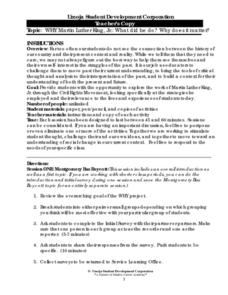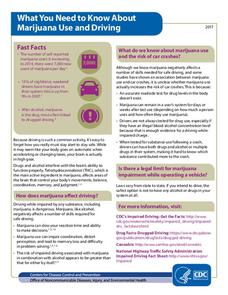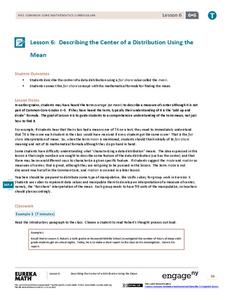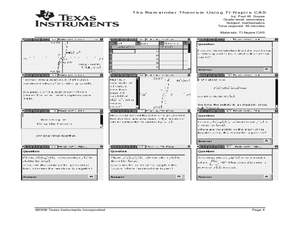Curated OER
Subject-Verb Agreement - To Do (do, does)
A straightforward worksheet on subject verb agreement challenges your young grammarians to identify the proper form of to do. Twenty questions prompt pupils to rewrite sentences with either do or does. This worksheet would be a great...
PBS
Racial Equality: How Far Have We Come and How Far Do We Have To Go?
Is everyone treated fairly in America? The culminating fifth lesson from a series of five has pupils explore racial inequalities from the 1960s and decide whether or not society has changed over time. The lesson comes with a speech from...
Virginia Department of Education
Multiplying Polynomials Using Algebra Tiles
Tiles are not just for algebra—see how they can help with multiplication too. Young mathematicians learn to use algebra tiles to model the multiplication of polynomials. A follow-up worksheet provides practice with the skill.
Curated OER
Using Por and Para
Clear up confusion around por and para. These words can be very difficult, especially for learners who are native English speakers. The information section describes when to use each word and provides examples of specific situations....
Curated OER
English in Mind Unit 4: Grammar Practice
In this English grammar worksheet, young scholars write answers from given questions, put words in order to create a sentence, complete questions with do or does, and make sentences negative. Students answer thirty one fill in the blank...
Umoja Student Development Corporation
Martin Luther King, Jr.: What Did He Do? Why Does It Matter?
Young historians examine the work of Martin Luther King Jr. by reading and answering questions about the Montgomery Bus Boycott, the Albany Movement, the Birmingham and Chicago campaigns, and the Memphis Sanitation Worker's Strike....
Code.org
Using Simple Commands
Turtles might be slow, but class will zoom by when your pupils build a program in which reptiles draw a grid. Using App Lab and JavaScript, class members build a program to find the most efficient way to draw an image of a...
Classroom Law Project
Who are the major candidates and where do they stand?
Who were the candidates in the 2008 US Presidential election and where did they stand on important issues? Use a resource that offers an opportunity to go back in time and examine candidates and issues involved in that election year.
Centers for Disease Control and Prevention
What You Need to Know about Marijuana Use and Driving
Research indicates that marijuana can negatively affect coordination and judgment, making it dangerous to drive while under the influence. But does it increase the risk of car crashes? An informative fact sheet describes the ways...
EngageNY
Describing the Center of a Distribution Using the Mean
Everyone does their fair share. The sixth segment in a 22-part unit presents the mean as a fair share. Groups build a conceptual understanding of the mean of a data set, rather than simply learn an algorithm. Learners use the...
CK-12 Foundation
Intercepts by Substitution: Finding a Linear Product Using a Quadratic
Discover another way to interpret multiplication. Using an interactive, learners slide points (representing the factors of multiplication) along the x-axis of the graph of y = x^2 and observe changes in the line segment connecting the...
Curated OER
“Everyone Else Does It!” Ethics Project
Do you have good ethics? How about good morals? Scholars investigate the role business ethics, morals, and values play in society. Through role play, group work, and readings, they uncover the basis behind the importance of being...
Curated OER
What is Public Use?
Explore the Fifth Amendment by examining the meaning of "public use" as learners read a scenario and role play their assigned parts to determine "public use." They also read Supreme Court Cases regarding the amendment and present their...
Curated OER
Introduce Vocabulary: How Do Dinosaurs Go To School? (Yolen)
Dinosaurs don't go to school...but what if they did? Use Jane Yolen's book How Do Dinosaurs Go To School to explore vocabulary in context. Find this on YouTube if you don't have the text on hand. These in-text words give some...
Curated OER
Introduce Vocabulary: How Do Dinosaurs Say Goodnight? (Yolen and Teague)
If you are reading Jane Yolen's fun story How Do Dinosaurs Say Goodnight?, use these strategies to enhance the experience for budding readers. What new words will they learn? Find detailed comprehension questions for these...
Curated OER
Introduce Vocabulary: Mama, Do You Love Me? (Joosse)
Barbara Joosse approaches an age-old question through an equally traditional culture in her story Mama, Do You Love Me?, which helps budding readers explore Native American vocabulary in context. Here you'll find...
American Museum of Natural History
What do you know about Biodiversity?
What do your classes know about biodiversity? A 10-question online quiz asks questions related to biodiversity and species groups. As learners answer questions, they click on links to additional information. The lesson could be an option...
PBS
Using Primary Sources: The Rogue's Gallery
What would be in your life's scrapbook? Scholars use short video clips, primary and secondary documents, and photos to investigate a 1909 scrapbook. They analyze and uncover what the Rogue Book tells them about the past in Western...
PBS
Using Primary Sources: Wide Open Town
A picture speaks a thousand words, no matter how old! Scholars use political cartoons from the era of Prohibition and the Temperance Movement to analyze what, a primary document (in this case, a bootlegger's notebook) is telling them...
Curated OER
Introduce Vocabulary: Alexander, Who Use to be Rich Last Sunday (Viorst)
Although this vocabulary-in-context activity is focused on Judith Viorst's book Alexander, Who Use to Be Rich Last Sunday, the strategy can be applied to any book budding learners read with you. First, introduce the three...
Curated OER
History Detectives: Who Does the Bag Belong To?
Turn your kids into super sleuths! They use all eight clues to determine who owns the mystery bag. Each slide shows one clue to the famous person's identity, it's up to your class to find out who the bag belongs to! Tip: This idea could...
Wadsworth Atheneum Museum of Art
Can Girls Do That?
Why be limited by stereotypes? Young scholars examine a series of works of art, list the different ways boys and girls are represented, and then discuss the common stereotypes found in the works. They then search for art that does not...
Curated OER
Learning Vocabulary by Using Reference Materials
Finding engaging ways to help your middle schoolers build their vocabulary is not easy to do. The instructional activity presented here offers a great way to motivate them to build vocabulary by making it into a game. Teams of pupils use...
Curated OER
The Remainder Theorem Using TI-Nspire CAS
Investigate the Remainder Theorem in this algebra instructional activity. Explore the relationship between the remainders of polynomial division and the function. Each of the four problems gets progressively more complicated. This might...























